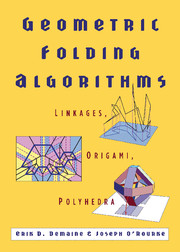Book contents
- Frontmatter
- Contents
- Preface
- 0 Introduction
- Part I Linkages
- Part II Paper
- 10 Introduction
- 11 Foundations
- 12 Simple Crease Patterns
- 13 General Crease Patterns
- 14 Map Folding
- 15 Silhouettes and Gift Wrapping
- 16 The Tree Method
- 17 One Complete Straight Cut
- 18 Flattening Polyhedra
- 19 Geometric Constructibility
- 20 Rigid Origami and Curved Creases
- Part III Polyhedra
- Bibliography
- Index
11 - Foundations
Published online by Cambridge University Press: 07 September 2010
- Frontmatter
- Contents
- Preface
- 0 Introduction
- Part I Linkages
- Part II Paper
- 10 Introduction
- 11 Foundations
- 12 Simple Crease Patterns
- 13 General Crease Patterns
- 14 Map Folding
- 15 Silhouettes and Gift Wrapping
- 16 The Tree Method
- 17 One Complete Straight Cut
- 18 Flattening Polyhedra
- 19 Geometric Constructibility
- 20 Rigid Origami and Curved Creases
- Part III Polyhedra
- Bibliography
- Index
Summary
We believe that research in mathematical origami has been somewhat hampered by lack of clear, formal foundation. This chapter provides one such foundation, following the work of Demaine et al. (2004, 2006a). Specifically, this chapter defines three key notions: what is a piece of paper, what constitutes an individual folded state (at an instant of time) of a piece of paper, and when a continuum of these folded states (animated through time) forms a valid folding motion of a piece of paper. Each of these notions is intuitively straightforward, but the details are quite complicated, particularly for folded states and (to a lesser extent) for folding motions. In the final section (Section 11.6, p. 189), this chapter also proves a relationship between these notions: every folded state can be achieved by a folding motion. At first glance, one would not normally even distinguish between these two notions, so it is no surprise that they are equivalent. The formal equivalence is nonetheless useful, however, because it allows most of the other theorems in this book to focus on constructing folded states, knowing that such constructions can be extended to folding motions as well.
While we feel the level of formalism developed in this chapter is important, it may not be of interest to every reader. Many will be content to skip this entire chapter and follow the rest of the book using the intuitive notion that mathematical paper is just like real paper except that the paper has zero thickness.
Information
- Type
- Chapter
- Information
- Geometric Folding AlgorithmsLinkages, Origami, Polyhedra, pp. 172 - 192Publisher: Cambridge University PressPrint publication year: 2007
